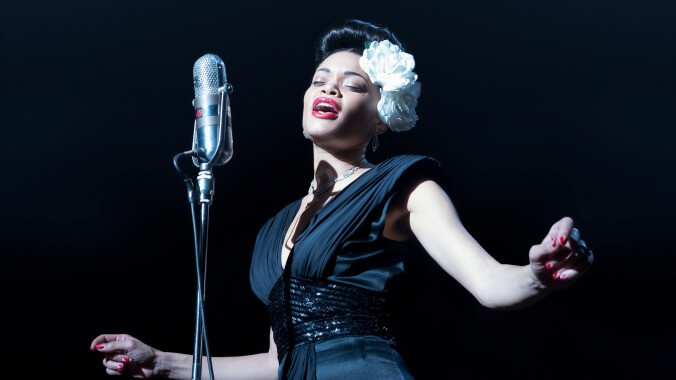It’s the audience that loses in Lee Daniels’ bloated The United States Vs. Billie Holiday

Harry Jacob Anslinger, who started as a railroad bull, spent more than 30 years as the commissioner of the Treasury Department’s Federal Bureau Of Narcotics, running the first war on drugs, which was largely a war against jazz, Black people, and the Mexican border. Much of the lurid sensationalism attributed to him (but mostly written by others) has passed into stoner legend. But the historical record tells us that these scare tactics—stories of white teenagers driven to madness and murder by Cab Calloway—had little influence on public opinion, and that Anslinger’s own motives and statements were contradictory. For the most part, he was after budgets and bureaucratic power.
Such a distinction (which tells us something about the subtexts of racism) doesn’t interest Lee Daniels. Barely 15 minutes into The United States Vs. Billie Holiday, a G-man declares, of Holiday’s immortal “Strange Fruit,” “People are calling this song a starting gun for this so-called civil rights movement!” This is 1947, which means that the line is not just a clunker but an anachronism. In Daniels’ take on the tragic destruction of Holiday (Andra Day) and her simultaneous struggles with the feds, heroin addiction, and her messy personal life, the forces of oppression are not directed at their own time: They are trying to keep our more enlightened values down.
Daniels obviously isn’t a realist. Since his breakthrough, Precious, he has developed a reputation as a director who throws in everything but the kitchen sink. In fact, one can’t help but think that what The United States Vs. Billie Holiday really needs is more melodrama. The material is ambitious and irresistible: Holiday’s arrest, conviction, and incarceration for drug possession, which came at the height of her popularity; her self-destructive streak; the furor over “Strange Fruit”; her romance with Tallulah Bankhead (Natasha Lyonne) and peculiar relationship with Jimmy Fletcher (Trevante Rhodes), the Federal Bureau Of Narcotics agent who was initially sent to infiltrate her inner circle.
But the script, adapted by Pulitzer Prize winner Suzan-Lori Parks from “The Hunting Of Billie Holiday,” an article by the journalist Johann Hari that was later included in Hari’s book Chasing The Scream: The First And Last Days Of The War On Drugs, is more timeline than drama. Day, who’s very good, moves through it with comfort and charisma. Her Billie Holiday is as much a star in the green room as she is onstage, faced with applause or the harsh bathroom-mirror reflection of abuse and addiction. But many of the other characters might as well be reading off of cue cards. (The usually reliable Garrett Hedlund, miscast as the Holiday-hating Anslinger, is one of the more hopeless examples.)
One might make the case, as Daniels is straining to, that this is all about emotion. Occasionally, he borrows from the top narcotic stylists. There are imitations of editor Thelma Schoonmaker’s rapid dissolves, and scenes that look like they might have been mood-boarded to stills from Wong Kar-wai movies. When things get loose and improv-y, Holiday and her backstage confidantes seem like they stepped in straight from the modern world, surrounded by the repressed and the repressive, who move stiffly in their suits, with frozen facial expressions.
However, this central thesis isn’t enough to sustain 130 minutes’ worth of movie. Daniels soldiers on, dragging the film from one montage of sex, drugs, and vocal jazz standards to the next, pausing for sit-downs in tyrannically wallpapered rooms, where the less interesting supporting characters are called upon to explain what makes Holiday so important. Is the world cruelly closing in around the great chanteuse? Sure. But the prettified claustrophobia grows repetitive and finally static.